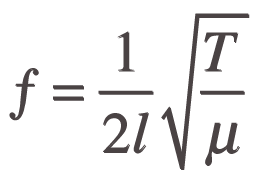
 |
|
#1
|
|||
|
|||
|
I realize that shorter scale guitars seem to reduce string tension but are there actual string types (80/20, monel, PB,) or brands that are less "stiff"?
__________________
Ibanez AC240 (The Happy HOG) More to come!!! |
|
#2
|
|||
|
|||
|
String "tension" is a combination of scale length and string construction (core size, shape, wrap thickness etc...).
String "feel" has to do with tuner position, break angle etc... as well as string construction as well. |
|
#3
|
|||
|
|||
|
String questions seem to be popping up frequently these days.
The Mersenne-Taylor equation relates the vibrating frequency of a string, f, to its vibrating length, l, its mass/unit length of string, m, and its tension t, as shown below.  What can be learned from the equation is that if you make a string shorter, but tune to the same pitch, the tension will be less. What can also be learned is that for a specific, fixed string length and fixed pitch, the tension on the string is directly proportional to the mass/unit length of the string. That is, the greater the mass/unit length, the greater tension for a given string length and pitch. There are three ways to alter the mass/unit length. The first is to use a larger diameter string. The second is to over-wrap the string with windings. The third is to change the material from which the string/core is made. String manufacturers do all three. As a player, you have the option to choose between using a different gauge string, using a wound vs. unwound string, or you can use a different string material. All of those will alter the tension in the strings, for a given string length and pitch. |
|
#4
|
|||
|
|||
|
Quote:
__________________
Ibanez AC240 (The Happy HOG) More to come!!! |
|
#5
|
|||
|
|||
|
Quote:
Try 10's. The scale length has nothing to do with how many frets there are to the body joint. |
|
#6
|
|||
|
|||
|
Martin makes a flexable string.
http://www.sweetwater.com/store/deta...I0_hoCPlXw_web I use them and they feel real good. Good luck. |
|
#7
|
||||
|
||||
|
Sounds like it's time to play lots of different strings until you find the one's you prefer. However, for me, I try/play/experiment with many different strings for their tonal qualities - on a specific guitar - not tension. In the end no one is going to say - "wow, that guitar has great string tension". They, and you, will say "wow, that guitar sounds great".
Try going to string manufacturer's web sites and look at the specs for tension. I'll help out - here's D'Addario's. You can find similar information for other makers if tension is your deciding factor. http://daddario.com/upload/tension_chart_13934.pdf If you're looking for the "feel" of an electric try the Ernie Ball Super Slinky Acoustic Guitar strings. I've never tried them on acoustic but played them plenty on many electrics. Last edited by DenverSteve; 11-01-2016 at 08:01 AM. |
|
#8
|
|||
|
|||
|
John Pearse silk and steel flavor strings are nice for less string tension.http://www.stringsandbeyond.com/jope61siphbr.html
Also in addition to string height (action) check you truss rod/neck relief and set the neck as flat as possible (relief or lack there of). On some guitars I found relief has a bigger impact than string height on ease of fretting. |
|
#9
|
|||
|
|||
|
Quote:
|
|
#10
|
|||
|
|||
|
Quote:
So is it thinner than standard core wire (= less tension - more flexabile ?) and they just dont want to put people off / confuse, or is it - more flexible material(s) - typical evasive marketing. For a project someone could get the string tension gauge rigged up on these (and other evasive marketing brands). It's not like measuring CO2 emissions from German autos  Oh thats been done - right. Oh thats been done - right.
__________________
I play an 'evolved' (modified) Cowboy guitar Not sent from my iPhone using Tapatalk |
|
#11
|
|||
|
|||
|
Quote:
 Anyhow, I believe they are simply thinner cores.
__________________
Guild CO-2 Guild JF30-12 Guild D55 Goodall Grand Concert Cutaway Walnut/Italian Spruce Santa Cruz Brazilian VJ Taylor 8 String Baritone Blueberry - Grand Concert Magnum Opus J450 Eastman AJ815 Parker PA-24 Babicz Jumbo Identity Walden G730 Silvercreek T170 Charvell 150 SC Takimine G406s |
|
#12
|
||||
|
||||
|
Martin Flexible Core strings, about $5 a set, uncoated. Santa Cruz low tension parabolic, $18 a set, micro coated. There are others also.
__________________
Barry Youtube! Please subscribe! My SoundCloud page Avalon L-320C, Guild D-120, Martin D-16GT, McIlroy A20, Pellerin SJ CW Cordobas - C5, Fusion 12 Orchestra, C12, Stage Traditional Alvarez AP66SB, Seagull Folk Aria {Johann Logy}: |
|
#13
|
|||
|
|||
|
I usually make up my own sets from singles. I like a 10, and light thru the A string, but for the low E I will stay with a 52-56 depending on the instrument. The balance of sound will be very even, even tho the first 5 are a much lighter set, but if you don't keep a heavier low E to me it sounds dead. I never feel the tension is too much on that one string and it makes for a great fingerstyle guitar. Some strings like GHS white bronze use a smaller core and have less tension for the same gauge, as do their vintage bronze. Both are nice strings to use, my favorite is the white bronze. I believe string length, core and wrap all have to do with tension for the same tuning note.
__________________
 THE WORLD IS A BETTER PLACE JUST FOR YOUR SMILE THE WORLD IS A BETTER PLACE JUST FOR YOUR SMILE
Last edited by pops; 11-02-2016 at 07:51 AM. |